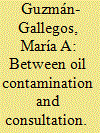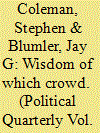| Srl | Item |
| 1 |
ID:
178620


|
|
|
|
|
| Summary/Abstract |
Adjacency, notwithstanding its status as a basis for generating maritime entitlements, has no place as a principle under the existing law of the sea. To endow it with such status in the negotiation of an agreement for the conservation and sustainable use of marine biological diversity in areas beyond national jurisdiction (BBNJ) is likely to upset the delicate balance between the rights of coastal states and those of the international community, which is essential to the widespread acceptance of United Nations Convention on the Law of the Sea (UNCLOS). This article argues that the access regime for marine genetic resources (MGRs) straddling the boundary between areas beyond national jurisdiction (ABNJ) and areas within national jurisdiction (AWNJ) should be location based, and adjacent coastal states should not be accorded preferential rights in the distribution of benefits. However, due regard should be paid to the rights and legitimate interests of adjacent coastal states when transboundary impacts may result from measures adopted for and activities conducted in ABNJ, including those that directly affect MGRs straddling the boundary between ABNJ and AWNJ. At the procedural level, coastal states should be allowed to participate, primarily through prior notification and consultation, in the adoption of area-based management tools (ABMTs) in ABNJ and the conduct of environmental impact assessment (EIA) with respect to activities therein.
|
|
|
|
|
|
|
|
|
|
|
|
|
|
|
|
| 2 |
ID:
152784


|
|
|
|
|
| Summary/Abstract |
In this article, I explore the interconnections among severe oil contamination, a state-led consultation process, and compensation practices in Peru’s oldest oilfield. I discuss the way in which four indigenous organisations and their constituencies produced evidence of oil contamination, and forced the state to question Peru’s current oil extraction practices. I look at the compensation demands and corporate payments that followed, and examine how compensation became a dominant tool for both appeasing increasing uprisings, and for counteracting what local people perceive as state abandonment. Focusing on the effects that compensation measures have on daily life, I analyse how equivalences between affected water and lands, on one hand, and state investments and monetary payments on the other, are established. I discuss how these equivalences have led to making indigenous ways of life irrelevant, and how this has been reinforced by the emphasis on due process during state-led consultation.
|
|
|
|
|
|
|
|
|
|
|
|
|
|
|
|
| 3 |
ID:
096260


|
|
|
|
|
| Publication |
2010.
|
| Summary/Abstract |
Using the Parliamentary Communications Allowance, MP David Drew recently conducted a large scale research project into public opinion on the British Constitution. There could not have been a better time to do so. Not only are we in the wake of severe economic and political crises, but also a period of unprecedented legislative interest in the constitution. Coordinated by Ed Leighton (an undergraduate at the LSE), the project consisted of a postal survey of 43,000 households, public debates around the constituency and workshops in local schools. The response from the public was incredible, and the results both interesting and unexpected. This article will outline some of those findings and demonstrate that large scale consultations with the public are both readily achievable and warmly welcomed. That this can all be done within the budget of the Parliamentary Communications Allowance also shows that at its best this fund can be used to genuinely engage with the public.
|
|
|
|
|
|
|
|
|
|
|
|
|
|
|
|
| 4 |
ID:
150663


|
|
|
|
|
| Summary/Abstract |
In Ireland the deployment of onshore wind turbines has become progressively more difficult in some areas because of the potential negative externalities associated with their operation. Using a discrete choice experiment (DCE) we employ a willingness to accept framework to estimate the external effects of wind turbines on local residents with the inclusion of community consultation and to quantify the compensation required to permit wind farms to be built in Ireland. Our findings reveal that the majority of respondents are willing to make (monetary) tradeoffs to allow for wind power initiatives and we find that respondents require less compensation if provision is made for a community representative and setback distance is increased.
|
|
|
|
|
|
|
|
|
|
|
|
|
|
|
|
| 5 |
ID:
107201


|
|
|
|
|
| Publication |
2011.
|
| Summary/Abstract |
his article considers the claims made by members of the current UK Coalition government to adopt a new style of listening, consultative politics based upon the so-called wisdom of the crowd. It considers how these claims have-and could have-been acted upon, focusing upon two central policy proposals; the funding of higher education and the reform of the National Health Service.
|
|
|
|
|
|
|
|
|
|
|
|
|
|
|
|